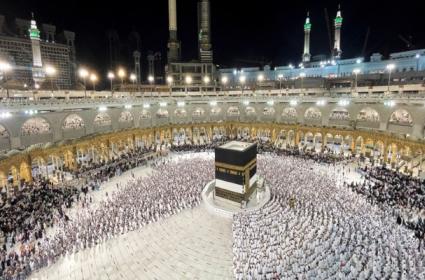Hajj: How the Holy Experience has Changed Post COVID-19?

Hajj holds a special place in the hearts of all Muslims around the world. It is one of the five pillars of Islam and is considered a once in lifetime duty for an able Muslim. Understanding the religious implications and sentiment attached to Makkah’s Grand Mosque and Prophet’s Mosque in Madinah, the Kingdom of Saudi Arabia has graciously hosted the pilgrimage for its citizens and the rest of the world for decades. For the past two years, the Kingdom had restricted foreign access to the holy mosques due to the pandemic but as we settle into our new normal, Saudi Arabia recently welcomed one million vaccinated people from across the world to perform the annual pilgrimage. The significance of the Hajj and the devotion it receives from Indian travellers plays a crucial role in furthering India’s ties with the Kingdom.
To ease travel for pilgrims, special budget flights were introduced by different airlines such as SpiceJet and Emirates to make travel comfortable for the pilgrims. Both nations have taken numerous measures to facilitate smooth pilgrimage for devotees. One of the key goals of the Indian Mission is to maintain the well-being and health of the pilgrims. According to Indian Consul General Md. Shahid Alam, 175 health professionals and 182 other employees are deputed to assist pilgrims at various levels. The Kingdom’s authorities are leaving no stone unturned to welcome pilgrims and ensure their wellbeing. This year, to beat the heat, pilgrims will be showered with water droplets along the way during the pilgrimage.
Prior to the suspension, two lakh Indian Muslims had undertaken the pilgrimage in 2019. This year India’s quota for Hajj stood at 79,237, second only to Indonesia with 1,00,051. Out of 79,237 pilgrims, Uttar Pradesh leads with a total of 8,701 pilgrims. In 2019, Saudi Arabia also increased India’s quota for Hajj from 170,000 to 200,000 in line with its transformation strategy Vision 2030. The transformation strategy aims at diversifying the country’s economy and reducing its decades-old reliance on oil. Religious tourism plays a vital role in the Saudi economy. Through its Doyof Al Rahman Vision Realization Program (DARP VRP), part of Vision 2030, the Kingdom aims to create a transformative spiritual and religious experience for pilgrims by simplifying procedures and introducing special facilitation services. The Saudi government aims to increase the Kingdom’s capacity to accommodate more Hajj and Umrah visitors – from approximately 10 million visitors per year in 2019 to over 30 million by 2030. This is expected to increase demand for hotels and other tourist services in Mecca and Medina.
The Saudi government has been gradually increasing the ambit of e-services for pilgrims. The administration has been collaborating with the private sector to develop innovative digital solutions for pilgrims. Case in point, by just tapping into their mobile phones, pilgrims will now be able to access several services offered by different companies. The Ministry of Umrah and Hajj has made considerable adjustments to guarantee a smooth and seamless journey. For instance, the Ministry in Saudi Arabia reduced Hajj prices for citizens and residents of the Kingdom. The Kingdom has also launched an electronic visa processing app through which an Umrah visa can be obtained within 24 hours of submitting the application.
To be sure, the Indian government has also introduced several reforms for the Hajj pilgrims, to make their journey seamless and comfortable. Some effective and far-sighted reforms introduced by the Indian government include lifting restrictions on women going for the pilgrimage to Saudi Arabia without a "mehram". Under the ‘Digital India’ campaign, the Indian government made Hajj process 100 per cent digital/online. Users can now file online applications, E-Visas. The Hajj mobile app, ‘E-MASIHA’ health facility, ‘E-luggage pre-tagging’ are other important digital services that work to provide pilgrims information regarding accommodation/transportation in Makkah-Madinah.
Hajj has been the harbinger of cultural and economic cooperation between India and Saudi Arabia. Importantly, it demonstrates how cultural diplomacy can further economic modernization and boost strategic cooperation between nations. It is safe to say that governments on both sides have implemented considerable reforms and changes to ease the process of Hajj, all to create a truly spiritual experience for pilgrims.
-By Dr. Faryad Hussain, Professor, Maulana Azad National Urdu University, Hyderabad














